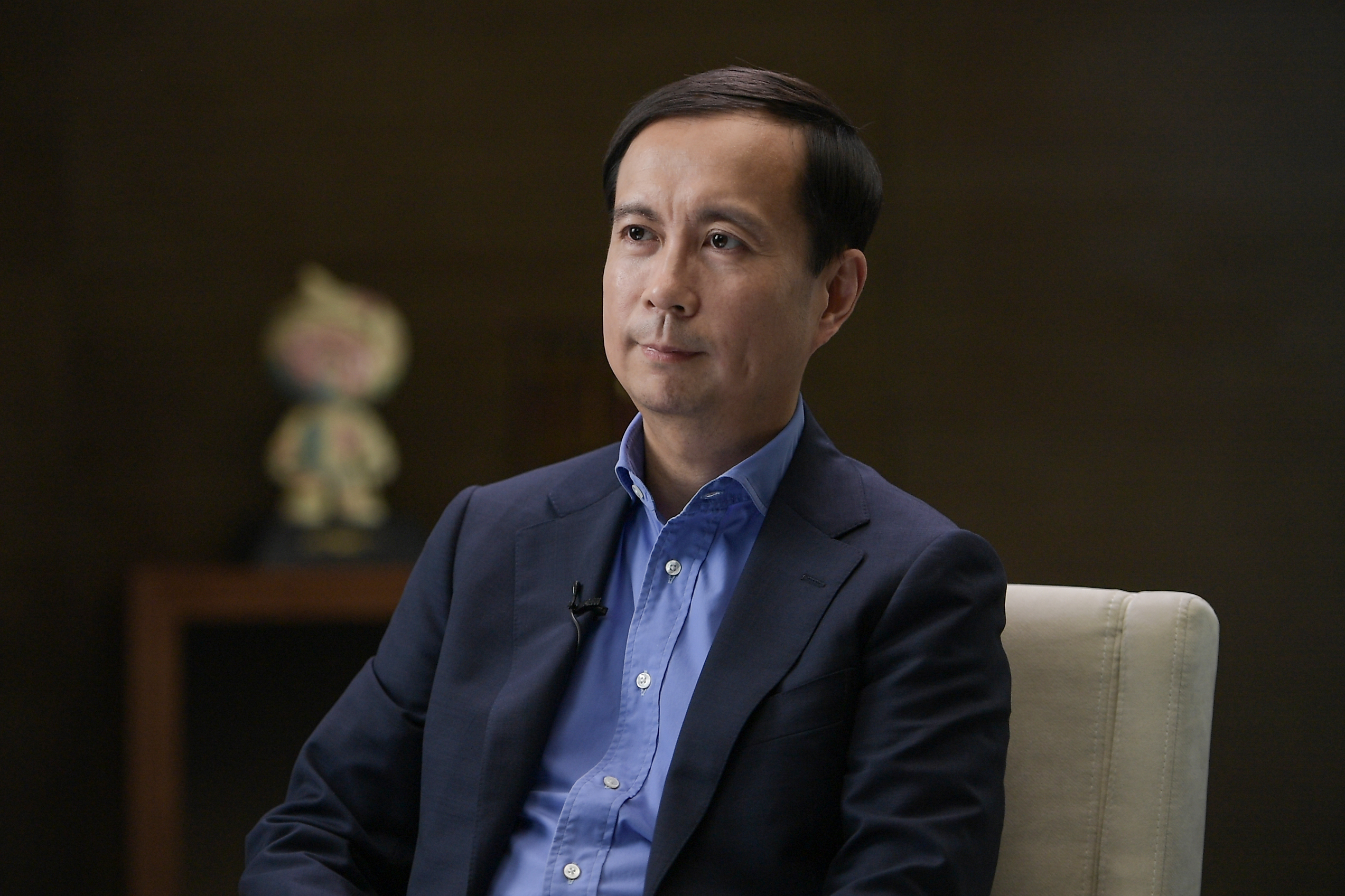


This year marks the 11th 11.11 Global Shopping Festival. Over the past decade, 11.11 evolved from a novel promotional campaign to draw consumers to what was, in 2009, the newly established Tmall into the world’s largest single-day shopping event today.
In a recent interview, Alibaba Group Executive Chairman and CEO Daniel Zhang opened up about this year’s mega sale, developing the next generation of Alibaba leaders, globalization, the Alibaba Business Operating System and what it will take for Alibaba to become a “good company that lasts 102 years.” The interview has been edited for clarity and length.
This year’s 11.11 is being overseen by Jiang Fan, president of Taobao and Tmall. Why do you feel confident about passing the baton to him? What are your expectations?
Jiang Fan has already taken on major responsibilities as the president of our China e-commerce marketplaces Taobao and Tmall. I think he and his team have proved their ability, their insightfulness into the market and business acumen, as well as operational capability. 11.11, which started in 2009 as a small promotional event, has grown to a major festival for global consumers in its 11th year. We’ve experienced an extraordinary 10 years. Over the years, we’ve seen consumers become more diverse and younger. Each generation of consumers needs their own peers to serve them. I strongly believe that we need to not only understand our consumer’s way of life, but also share the same lifestyle.
WATCH: Daniel Zhang on 11.11 – This Year, I’m Focused on Shopping
I think this young team is the future, and can really lead the evolution and growth of Chinese consumption. They give new meaning to 11.11. They not only create value for Taobao and Tmall, but also drive the development of both China’s domestic consumer market and markets around the world. This year, my job is to mobilize resources across the Alibaba digital economy in support of the 11.11 team. I know they will use their creativity and enthusiasm and imagination to offer a completely new 11.11 experience for consumers, as well as merchants.
What will you be doing when the clock strikes midnight on Nov. 11?
This year will actually be a brand-new experience for me: I can focus on shopping. For the past 10 years, I have been stationed at our command center with the responsibility to make sure everything was on track and all systems are ready when the event kicks off. At the most intense moment, just before clock strikes midnight, I would take the stage to count down to the start of the event. This year my most important responsibility is to shop and be a consumer. I plan to share real-time feedback with the team to help them gain a better perspective of the user experience and create the best 11.11 for our consumers.
WATCH: How Chinese Consumers Shop for 11.11
This will also be the first 11.11 since the Alibaba Business Operating System was unveiled earlier this year. What was the rationale behind ABOS?
Today, our customers across all industries are looking to digitize. They want to move towards real digital operations, instead of just using the internet only as a sales channel. So, the question becomes, how can we leverage our services and innovative technology, which we have built and refined over the last 20 years, to offer an industry-tailored, total solution for our merchants? This is not just to help them sell more products, but to incubate new products, optimize supply chains and even drive innovation within their organizational structure. For companies to have real digital operations, they need a corresponding business operating system. This is essential. But having an operating system is not enough. Companies have to have a clear value proposition, and their products and services have to offer real value to customers. Only if they can meet all these criteria can they perfectly align technology with business to keep reinventing themselves for the future.
Alibaba pioneered the concept of New Retail, which merges the best of physical retail and online experiences. How will Alibaba help merchants continue to digitize through New Retail?
Our work in this area is ongoing. Digitization is happening across different industries. You will see manifestations of it during the upcoming 11.11. Our partners in the fast-moving consumer goods and grocery sectors, such as RT-Mart, or home decor retailers, such as Easyhome or Red Star Macalline, will fully participate in 11.11. They will showcase their latest efforts in digitization. Digitization can catalyze new growth for companies and help them grow a new set of wings. But the most critical thing is whether your business model is truly operating efficiently and creating value for consumers.
VIDEO: New Retail Explained
At the company’s 20th anniversary celebration in September, you said Alibaba aims to be a “good company that lasts 102 years” rather than pursuing power or scale. What makes a company “good” in your view?
“Good“ in my mind is defined by our contributions to society’s positive development, and being able to support users and the industry in a sustainable way.
Alibaba has greatly benefited from social progress to grow into the platform that we are today, and we have a duty to give back to society and our users in this digital era. Our customers are our top priority, and we must continue to generate positive value for them. We must also drive and champion positive action within our community. Only through investing in our customers and our community can we bring about a culture of integrity and a sustainable society where resources aren’t wasted and everyone shares the benefits. This is what we focus on as Alibaba works to be a “good” company – our duties and responsibilities towards society.
In September, you shared a new goal to serve more than 1 billion consumers globally and surpass RMB 10 trillion in GMV by fiscal 2024. Can you elaborate on this and how Alibaba plans to achieve this goal?
This is an ambitious goal, but our roadmap is very clear. Today, we already serve 700 million consumers in China, and we definitely have the potential to reach 1 billion consumers. We see tremendous opportunity in the market. Every year, we see so many new users. The new generation are starting to access the internet at younger and younger ages, and they will be unlikely to break this bond even if they reach their 50s or 60s. They will lead completely different lifestyles from what we know now. With respect to achieving our goal of surpassing RMB 10 trillion, the most important driver is to continue to provide users with everything and anything they need when they need it. This means thinking about expanding product categories and user scenarios, so that their lifestyles and consumption are all connected to Alibaba in some way. We have to grow our user base as well as expand product categories. We are determined to reach these goals.
What is Alibaba’s globalization strategy?
Globalization continues to be a key pillar of our three-pronged strategy for the future. We have defined our globalization strategy as the “Five Global” initiatives: Global Buy, Global Sell, Global Pay, Global Delivery and Global Fun. We are committed to this approach, and we’re making concrete progress. Our total annual active consumers outside of China exceeded 130 million as of the end of June. And we are continuing to grow each quarter.
Regarding our globalization goals, first and foremost it is to serve more consumers. We will do so by meeting their needs for diverse physical goods, while introducing more fun into their lives and improving lifestyles. This is very important to us. And in the process, it is critical that we develop the necessary basic infrastructure for the digital age, which includes logistics, payments and securing supportive government regulations. Through this inclusive infrastructure, we will continue to make steady progress to realize our “Five Globals.” Ultimately, we hope to see Alibaba evolve from a China market-focused platform business into becoming a truly global platform for trade and commerce, and realizing our dream of making it easy to do business anywhere.
There are so many market opportunities around the world. Which markets do you think offer the most potential?
Each place has its own unique social, economic and political environment, as well as its own way of life. The most important thing is to provide products and services relevant to local consumers.
Lately we have been focused on the Southeast Asian market, particularly in e-commerce and logistics. The user demographic is very young, while the combined population is very large. Through Lazada, we serve over 50 million people in six countries. Many countries have leapfrogged past the PC and went right to mobile, providing a solid foundation for the development of e-commerce and digital businesses. We will continue to expand our footprint in this market, leveraging China’s manufacturing base to bring more differentiated offerings and experiences for the region. We are also leveraging cross-border platforms, such as AliExpress, to cover even more markets, including Europe and North America.
WATCH: Lazada and the Southeast Asia Opportunity
China’s economy is showing signs of slowing. Against this backdrop, how do you plan to lead Alibaba forward?
The common consensus is that China is shifting from an export- and investment-driven economy toward a domestic-oriented economy, with a focus on consumption and service. The Chinese domestic market will become a growth engine for the Chinese economy.
Over the past 20 years, Alibaba has worked to create the world’s biggest online marketplace. We serve 700 million consumers in China and, in the future, I am confident that we will serve 1 billion consumers. We can satisfy the needs of the consumer across all dimensions of his or her current lifestyle and future lifestyle, from what they wear to what they eat to where they live to how they get around to how they have fun. We can deliver goods and services and experiences to consumers in highly efficient ways. I believe we will be an important vehicle for this ongoing transition by the Chinese economy toward domestic-driven consumption. We offer our merchants and partners an effective way to enter the market and capitalize on the opportunity. We are not just a sales channel, but rather a comprehensive platform that can help merchants to build consumer awareness, establish their brand image and manage consumer assets. As such, we have identified stimulating Chinese domestic consumption as the second key strategy in addition to globalization.
Alibaba aims to be a company that will last for 102 years. What are the future engines for sustained growth?
I think sustainable growth will come from implementing our three core strategies. We will continue to expand our consumer base, within China and around the world. We will continue to diversify and grow product and services offerings to meet the needs of consumers in all aspects of their daily lives. At the same time, we want to enable our enterprise clients to serve their customers better, as well as help them adopt data technologies using Alibaba’s infrastructure services, which were designed for the digital age. This will empower all of our clients to transform their business operations and become true internet companies like Alibaba. I believe this will be the real driving force that will help us realize our goals.





